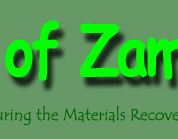



|
OVERVIEW
THE
LAW
THE
PROCESS
THE
PRODUCT
GLOSSARY
MENU
OVERVIEW
The problem on solid waste and its management has become a genuine concern of the nation. The rapidly swelling population, increasing urbanization and intensifying economic activities have all contributed to the generation of solid wastes, especially in the urban centers and urbanizing areas.
In response
to this problem, government has adopted measures and taken steps, among
which are the expansion of solid waste management services, provision
of more cost effective collection and hauling services, development
and implementation of other solid waste disposal approaches such as
sanitary landfill, incineration and waste-to-energy disposal schemes.
COMPOSTING AS ZAMBOANGA’S ANSWER TO THE 3R’s
Composting is one of the elements of the Integrated Solid Waste Management Programme of the Philippines. Source reduction first, recycling and composting second, and disposal in landfills or waste combustors last.
Composting is a specialized form of recycling and forms a critical part of the waste minimization Programme based principally on the 3R's:
• Waste Reduction
• Reuse of waste
• Recycling
ADVANTAGES
As an effort to minimize waste, composting would extend the estimated life span of the landfill considerably.
Upon completion of the process the resultant compost is a useful and valuable product. Compost is one of the best sources of organic soil conditioner as it improves both aeration and nutrient content of the soil.
- For
sandy soils, compost helps to hold water and nutrients better.
- For clay soils, compost improves internal drainage, making it easier to work with the soil.
Composting also serves to substantially reduce the quantity of waste that is taken to the landfill therefore extending the life of the landfill.
Composting can save you money:
- Less
money has to be spent to buy plant fertilizers.
- If lawns and gardens are usually irrigated, it saves on water bills since the resultant compost retains more soil moisture.
Composting can increase plant production by
- Contributing
to soil stabilization.
- Improving
yields
- Providing a constant source of soil-conditioner.
Composting can contribute to an improved environment because:
- Waste is converted into a valuable and easily to used resource
- Landfill
space is saved because of the waste diverted Nutrients are recycled
back into the soil
- Offensive
odors emitted from the landfill are reduced as the amount of decaying
organic material in the landfill is reduced.
These are
the most important reasons for composting in the Philippines. Soil enhancing
and income from composting are added benefits. However, markets for
the compost must be established to make this part of waste management
sustainable.





